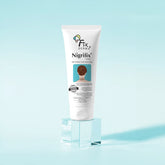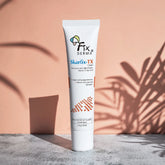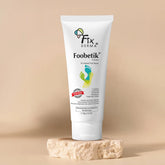Which is the best chemical exfoliator?
Does your current skincare routine contain chemical exfoliation? If not then it’s time to include the best chemical exfoliator in India for the face! Chemical exfoliants are a lifesaver for smoothing, brightening, and clarifying skin for a radiance-boosting glow. Chemical exfoliants, like physical exfoliants (such as face scrubs and washing brushes), aid in the removal of dead skin cells, but in a much more regulated and exact manner.
Chemical exfoliator for face benefits
These are the skin-loving actives that are carefully created to eliminate the surface build-up of dead skin cells on the skin, resulting in healthy and beautiful skin. These exfoliants also operate on congested pores to eliminate pollutants. Furthermore, chemical exfoliation protects and repairs the skin from environmental damage, and it aids in the reduction of acne scars, dark spots, dull skin, pigmentation, and even the obvious symptoms of ageing. They are available in a variety of concentrations, however, the most often used actives in these are AHA and BHA. Both AHAs and BHAs exfoliate the skin and address certain skin issues.
If you are looking for the best chemical exfoliator for sensitive skin shop for Fixderma Peelonate AHA. It is perfectly formulated with skin-nurturing ingredients such as Multifruit BSC, Red algae extract, and Vitamin E. It is a non-abrasive, non-drying chemical exfoliator that is suitable for even beginners too.
If you have oily skin and you are looking for the best and most gentle chemical exfoliator for oily and acne-prone skin, then shop for Fixderma Peelonate BHA. Specially formulated with Salicylic acid, Royal jelly mimetic, and Vitamin E, this chemical exfoliator absorbs deep into the skin, unclogs pores, removes trapped sebum and dead cells from the pores, and regulates the over-production of sebum. Not only for the face but if you are searching for a chemical exfoliator for the body, then these two chemical exfoliators work wonders.
Is chemical exfoliant good for the skin?
Chemical exfoliation is becoming increasingly popular in the skincare industry. Chemical exfoliants have become commonplace due to their effective components and apparent outcomes. Chemical exfoliation primarily deals with skin cells; our skin cells have a natural cycle throughout the body and replenish every month or so.
The goal of chemical exfoliation is to remove dead, dull, and dry skin cells from the epidermis, revealing brighter, smoother, and more rejuvenated skin underneath. It is an excellent therapy for a wide range of skin issues, including blackheads, whiteheads, fine wrinkles, sun damage, excess oil, and general skin texture. However, environmental variables such as our lifestyle, stress, exercise, sun exposure, and aging can all impede the process. That is why chemical exfoliation is used as a treatment. It's a simple and quick means of eliminating dead skin cells and this may definitely aid in boosting your complexion, and shine, brightening the face, and reducing various scars and blemishes or sunspots that may be existing on your face.
Benefits of chemical exfoliator:
- Removes dead skin cells
- Increases skin’s radiance
- Promotes even skin tone
- Smoothens skin texture
- Reduces wrinkles and fine lines
- Prevents clogged pores
1. What is a chemical exfoliator?
A chemical exfoliator uses active ingredients like AHAs (alpha-hydroxy acids) and BHAs (beta-hydroxy acids) to remove dead skin cells, helping your skin to appear smoother and more radiant.
2. How does a chemical exfoliator differ from a physical exfoliator?
Chemical exfoliators dissolve dead skin cells using acids, while physical exfoliators rely on abrasive ingredients like scrubs. Chemical exfoliators provide a more even exfoliation without the risk of microtears.
3. What are the benefits of using a chemical exfoliator?
Chemical exfoliators help unclog pores, reduce acne, brighten skin, and improve skin texture. Regular use promotes smoother, youthful skin by stimulating collagen production.
4. Are chemical exfoliators suitable for sensitive skin?
Yes, but it’s important to choose a gentle formula designed for sensitive skin. Look for exfoliators with mild acids like lactic acid or those that contain soothing ingredients to avoid irritation.
5. How often should I use a chemical exfoliator?
For beginners, start with once a week. As your skin builds tolerance, you can gradually increase use to 2-3 times per week. Always follow the product instructions to avoid over-exfoliation.
6. Can I use a chemical exfoliator with other skincare products?
Yes, but avoid using exfoliating acids with other active ingredients like retinol or Vitamin C at the same time to prevent irritation. Use chemical exfoliators in your evening skincare routine for best results.
7. Do chemical exfoliators help with acne scars?
Yes, regular use of chemical exfoliators, particularly products with salicylic acid or glycolic acid, can help fade acne scars by speeding up cell turnover and improving skin texture.
8. What are the best chemical exfoliators for dry skin?
Look for exfoliators with hydrating ingredients like lactic acid, which gently exfoliates while boosting moisture. Products like Fixderma’s chemical exfoliators with added moisturizing properties are perfect for dry skin.
9. Can chemical exfoliation cause irritation?
When used incorrectly or too often, chemical exfoliators can irritate the skin. Start slow, use the correct concentration for your skin type, and always apply sunscreen after exfoliation.
10. What is the difference between AHAs and BHAs?
AHAs are water-soluble acids that work on the skin's surface to exfoliate, perfect for dry and sun-damaged skin. BHAs, such as salicylic acid, penetrate deeper to unclog pores, making them ideal for oily or acne-prone skin.
11. Is chemical exfoliation safe for all skin types?
Chemical exfoliation can benefit all skin types, but the specific acid used should match your skin concerns. Oily skin benefits from BHAs, while dry and sun-damaged skin responds better to AHAs.
12. Do I need to use sunscreen after using a chemical exfoliator?
Yes, sunscreen is a must after using chemical exfoliators. Exfoliating acids can make your skin more sensitive to the sun, increasing the risk of sun damage.
13. Can I use chemical exfoliators on my face and body?
Absolutely! Many chemical exfoliators are formulated for both face and body, especially for treating areas prone to clogged pores, such as the back and shoulders.
14. What are the side effects of over-exfoliating?
Over-exfoliating can lead to redness, irritation, peeling, and increased sensitivity. It’s essential to balance exfoliation with proper hydration and avoid using exfoliators too frequently.
15. Can chemical exfoliators help with pigmentation?
Yes, regular use of chemical exfoliators, especially those containing glycolic acid, can fade dark spots and hyperpigmentation over time by speeding up the skin’s natural renewal process.
16. What makes Fixderma’s chemical exfoliators stand out?
Fixderma’s chemical exfoliators combine powerful exfoliating acids with soothing ingredients to ensure effective results without irritating the skin. Formulated for all skin types, they provide gentle yet impactful exfoliation.
17. How can I choose the best chemical exfoliator for my skin?
Choose a chemical exfoliator based on your skin type and concerns. For acne-prone skin, opt for BHAs like salicylic acid, while AHAs like glycolic acid are ideal for dry or mature skin.
18. Can I use a chemical exfoliator with other anti-aging products?
Yes, chemical exfoliators can be used alongside anti-aging products, but avoid using strong exfoliating acids with retinoids or Vitamin C at the same time. This combination may cause irritation and dryness.













